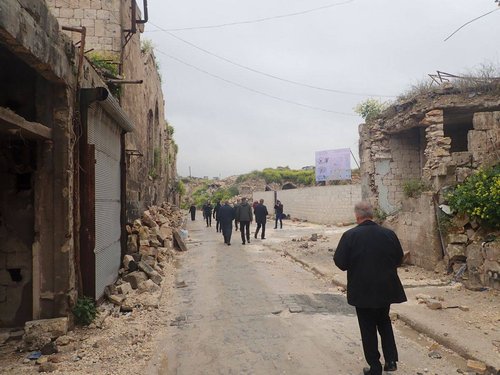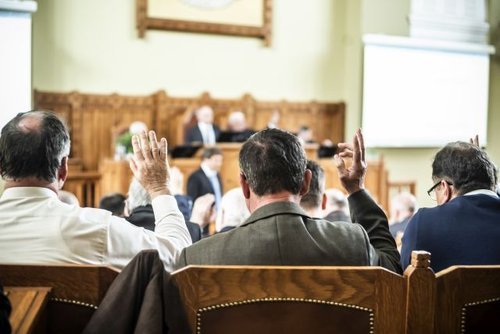“Without the renewal of hearts and reformation of our lives, every tradition fades away and new initiatives turns out to be empty,” said Presiding Bishop István Szabó in his opening address at the recent Synod meeting, where the Statement on Marriage, Family and Sexuality was reaffirmed.
“We must pray continuously, not only for our pastors, coworkers, teachers, elders, and those serving in diaconia, but also for revival,” reminded Bishop Szabo, “Without the renewal of hearts and the reformation of our life, every tradition fades away and every new beginning turns out to be empty.” According to the Bishop this is already being demonstrated in many places, especially in the current status of Western Christianity. He pointed out that there is only stagnation in our church according to recent statistics, “Growth is one of the attributes of the Church. Without spiritual renewal, there is no growth, and the Church is no longer attractive.”

Bishop Szabó challenged the members of the Synod by reminding them of a poem by Sándor Reményik, “You have little faith but you protest much.” The Bishop said that we shall grow in faith and protest through our faithfulness. “May God renew us in faith, hope and love,” he continued.
As an example of faithfulness, he spoke of his recent experiences in Syria.The RCH delegation had traveled to Lebanon and Syria at the end of March, visiting local congregations and church leaders in Damascus, Homs and Aleppo. The visit, with all its challenges, deeply inspired and moved the delegation members.

The Bishop said that if someone wants to know what war means, they need to see the pictures capturing war-torn Syria. However, it was amazing and shocking that those who had chosen to stay in the country have started to restore. It does not mean collecting old memories, it means, rather, looking to the future with hope and inventing new ways to lead an authentic Christian life in a ruined country.
The Christians in Syria teach us. Bishop Szabó continued that even in war it is possible to practice love towards our neighbors, and even as a persecuted community, they can become instruments of reconciliation among all nations. The Bishop quoted the Letter to Diogenetos, reminding the members of the Synod that this experience has always been a part of the life and witness of Christians: “As citizens, they share in all things with others, and yet endure all things as if foreigners … They love all men, and are persecuted by all. They are unknown and condemned; they are put to death, and restored to life.”
The Church’s commitment for solidarity and cooperation with Christians in the Middle East has been expressed also with the signing a memorandum of commitment with the National Evangelical Synod of Syria and Lebanon as well as the Union of Armenian Evangelical Churches in the Near East.
“As ‘Ambassadors for Christ’ in promoting peace and reconciliation, we strictly condemn and oppose any form of religious discrimination, oppression and persecution. In our cooperation, we therefore give special attention to helping Christian communities to remain and serve God in their homelands and be witnesses to the Good News of Christ, and thus invite and encourage others to join and support our common mission,” reads the Memorandum of Commitment.
In this spirit, Bishop Szabó urged for faithfulness and renewed commitment to many fields of church ministry, especially in education from kindergarten to higher education, calling for the need of an education strategy which reflects Christian values and Reformed virtues.
The Kindergarten project is a 90 million euro-project funded through the EU for the construction of new schools, extension of existing church-run institutions, and purchase of schools from other stakeholders. The Reformed Church in Hungary hopes to build a network of kindergartens that share in Christian values and spirituality. In addition to education, Reformed Pedagogical Institutes will focus efforts on offering personalized help to the emotional and cognitive developments of the children, and ensure proper preparation for future schooling, regardless of a child’s social and familial background, as well as their individual skills. This approach and principle of equal opportunities is a neglected issue in recent years in Hungary, causing the burden of educating children to increase.

Bishop Szabó also mentioned the importance of taking care of the Hungarian diaspora, highlighting the Kőrösi Csoma Sándor Scholarship Program run by the Hungarian Government which allows pastors to spend nine months in a diaspora community, supporting the local life and mission. He also reminded the Synod of the situation of the Hungarian-speaking Reformed Churches in the Carpathian Basin with special attention to the Reformed Christian Church in Slovakia.
A recent amendment by the National Council of Slovakia restricts the use of the foreign national anthems within the Slovak Republic. The law would criminalize playing any national anthem but the Slovak one at public event.Both the Synod Council of the Church in Slovakia and the General Convent issued a statement in response to a new law.
As a sign of the same faithfulness, the Synod revisited and reaffirmed its statement on Marriage, Family and Sexuality, as a response to the developments that more and more international Christian churches are facing challenges in this regard, and are inclined to change their previous biblical understandings due to social pressure, or out of true conviction.

The statement confirms that “based on the Holy Scripture the Reformed Church in Hungary considers marriage, the lifelong alliance between a man and a woman, as the good order of creation of God” which is “the basis for family life which God may bless with children.” According to the Statement, the RCH cannot accept same-sex partnerships as equal to marriage and in accordance with God’s creational order, however, it does not morally qualify the sexual orientation itself and opposes all forms of discrimination. The Church receives people with any sexual orientation “with considerate pastoral care, and [will] handle their profound human dilemma discreetly and with understanding…It is our duty to defend them against all forms of discrimination that violate their human dignity,” as written in the Statement.
By adopting the Statement, the Synod has been aware that its understanding might differ from the convictions of other churches and Christian communities, and it has also expressed its willingness for continued dialogue and the quest for better understanding in accordance with the confessional heritage of reservation of a better instruction. “We formulate our statement with freedom of conscience bound to the Scripture, ‘We must obey God,’ rather than to the spirit of our time,” reads the conclusion of the document.
Read the full text of the Statement here.
RCH Ecumenical Office